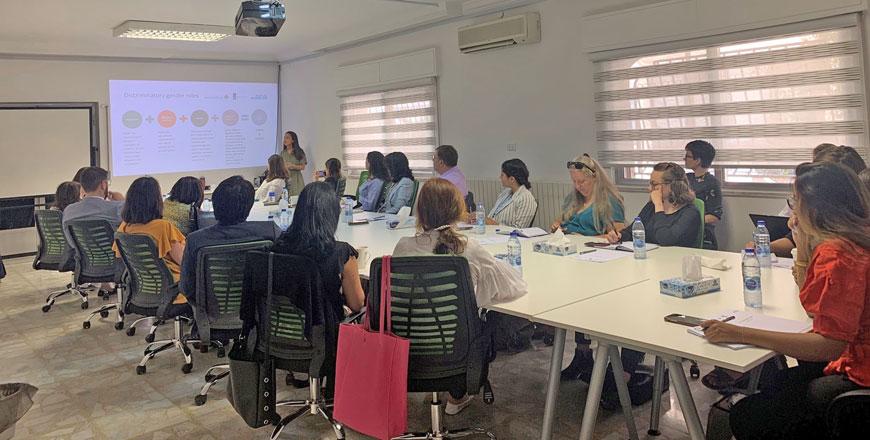You are here
Working women bear ‘double burden’ amid COVID pandemic, webinar hears
By Rana Husseini - Sep 30,2020 - Last updated at Sep 30,2020
AMMAN — Two local researches have revealed on Tuesday that the COVID-19 crisis has caused a “double burden” on working women who have to attend to household responsibilities in addition to working in the labour market.
The findings were made during a webinar titled: “Are we doing enough to ensure the inclusion of women in the workforce?” which was organised by the Information and Research Centre — King Hussein Foundation (IRCKHF).
During the one-hour webinar, the centre officials revealed the findings of two researches on social security laws and the impact of COVID-19 on working women. One research was titled: “COVID-19 and the Double Burden on Women in Jordan”, while the second was titled “Social Security Reforms and Women’s Employment in the Private Sector”.
The two researches were conducted by the IRCKHF in collaboration with Hivos organisation, under the project Women Empowerment for Leadership that is supported by the Dutch Ministry of Foreign Affairs.
The aim of the two researches was to explore the social security reforms and the gender implications of COVID-19 on division of labour and to ensure that women have equal opportunities and full capacity to participate in leadership positions, according to IRCKHF Director Aida Essaid.
“The researches also aimed at exploring ways in which the Social Security Law reforms changed hiring and retention practices of women in the private sector and how the amendment impacted women’s willingness to enter and continue working in this sector,” said Essaid.
One of the main findings, according to Essaid, is that women carry a “double burden” because of the current COVID-19 situation in the Kingdom and it is “known that in times of disaster, disease outbreak or war, most women take up greater responsibilities and are often overburdened with paid and unpaid work, which impacts their overall wellbeing”.
“The double burden is seen as unpaid work within the home sometimes referred to as reproductive work, which includes a variety of tasks like childbearing and caring, preparing meals, cleaning, laundry, maintaining the house, taking care of an elderly or family member with disability, among others,” Essaid said.
While paid work is tied to a monetary value, unpaid work is usually not recognised as real work, Essaid added.
Meanwhile, Labour Market Expert Shereen Abbadi said during the webinar that almost “two-thirds of non-working women would like to work and their preferences and personal beliefs are not a major obstacle to participation”.
However, Abbadi added that women’s labour force participation is “limited by binding constraints and intra-household expectations such as expectations from family members as well as lack of supporting services such as childcare centres and adequate public transportation”.
“Women also suffer from a scarcity of attractive job opportunities, jobs in the public sector, and lack of flexible and part-time jobs, in addition to discrimination in hiring and wage and limited job growth,” Abbadi noted.
Abbadi also said that some of the findings that was based on a survey indicated that 96 per cent of the population supports women’s participation in the labour force.
However, this high percentage of support for women’s labour participation starts to decline to 70 per cent if the woman is married, and the “acceptance percentage would further drop to 38 per cent if the woman was to work in a mixed environment and finally if the work exceeds 5pm, then the acceptance by the individuals who were surveyed becomes 26 per cent, according to Abbadi.
Jude Sajdi, Research Section head at the IRCKHF, added that the researches also explored the employer’s attitudes and practices towards hiring employees in their establishments.
While some firms looked for certain skills and qualifications when hiring, Sajdi noted, seven out of 20 firms stated their preference to hire men or unmarried women.
“Some cited the type of work as a determinant for hiring and others mentioned that marriage and childcare responsibilities make women less productive at work,” according to Sajdi.
Informal hiring practices not only increase the risk of discrimination in hiring, but also the risk of patriarchal practices, Sajdi stressed during the webinar.
Related Articles
AMMAN — On Wednesday, the Information and Research Centre-King Hussein Foundation (IRCKHF) hosted a panel of experts to discuss and evaluate
AMMAN — Starting Thursday, researchers can access the Takamol HAQQI Gender Clearing House platform for information on legislation, research
AMMAN — The Information and Research Centre – King Hussein Foundation (IRCKHF) on Thursday released a gender discrimination and inequality s

















